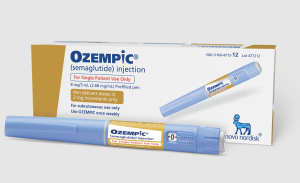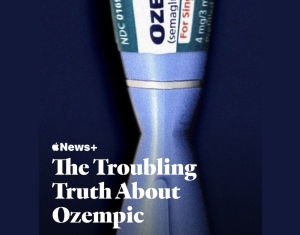 I’ve had many people approach me over the years about weight loss. Let’s face it, most people in the U.S. – statistics considered – have battled with their weight at some point in their lives. And who doesn’t want to be thin? This is neither a “comfortable in my skin” commentary nor a political op-ed. I respect people’s decisions, right or wrong, but most are at least aware that a leaner body is a healthier body. There is no debate about this, despite the widespread “acceptance” of the overweight or obese body habitus as promulgated by mainstream media. If you are overweight or obese, you are unhealthy, period. Just because your doctor tells you that your blood pressure and cholesterol are normal does not mean you are healthy if you’re fat. What it should say to you, however, is that you need a new doctor. Don’t believe me? I welcome any overweight or obese person to come to my office – FREE of charge – and I will personally show you biomarkers of disease. Obesity is a disease and a “gateway” disease to many other age-related diseases such as coronary artery disease, type II diabetes (another preventable disease that I won’t argue with you about – it IS preventable), cancer, and Alzheimer’s disease. The sooner you realize this, the sooner you’ll do something about it, reducing your chances of developing one of these dreadful diseases. But here’s the great news: Losing weight nowadays is easier than you think! This is partly due to a classification of molecules collectively known as incretins. So. what are incretins, and how can they help you in your battle of the bulge?
I’ve had many people approach me over the years about weight loss. Let’s face it, most people in the U.S. – statistics considered – have battled with their weight at some point in their lives. And who doesn’t want to be thin? This is neither a “comfortable in my skin” commentary nor a political op-ed. I respect people’s decisions, right or wrong, but most are at least aware that a leaner body is a healthier body. There is no debate about this, despite the widespread “acceptance” of the overweight or obese body habitus as promulgated by mainstream media. If you are overweight or obese, you are unhealthy, period. Just because your doctor tells you that your blood pressure and cholesterol are normal does not mean you are healthy if you’re fat. What it should say to you, however, is that you need a new doctor. Don’t believe me? I welcome any overweight or obese person to come to my office – FREE of charge – and I will personally show you biomarkers of disease. Obesity is a disease and a “gateway” disease to many other age-related diseases such as coronary artery disease, type II diabetes (another preventable disease that I won’t argue with you about – it IS preventable), cancer, and Alzheimer’s disease. The sooner you realize this, the sooner you’ll do something about it, reducing your chances of developing one of these dreadful diseases. But here’s the great news: Losing weight nowadays is easier than you think! This is partly due to a classification of molecules collectively known as incretins. So. what are incretins, and how can they help you in your battle of the bulge?
Incretins are naturally secreted by the GI tract in response to the presence of food and decrease blood sugar levels by 1. sending a satiety signal to the brain and 2. increasing insulin secretion from the pancreas. So why is this important? Because lower blood sugar levels result in lesser circulating insulin – long term – and therefore reduce the amassment of fat. Remember, fat is stored in the presence of chronically high insulin levels. In contrast, a low-insulin state mimics a fasted state and turns the fat-burning switch on. But there’s more. A low-insulin condition is also associated with a lesser incidence of age-related disease, less vascular disease, for instance, and therefore fewer heart attacks and strokes. Again, leaner and healthier. Two birds, one stone. Or one injection.
Everyone has heard of Ozempic® now that the celebrities have gotten ahold of it. Truth be told, this injectable incretin, or GLP-I agonist – has been around for years – as a treatment for type II diabetes. It wasn’t brought to market by Kim Kardashian, contrary to popular belief. I have been using in my clinic since 2020 – long before her – with dramatic results. Patients are not only losing fat with Ozempic®, but also maintaining muscle (provided their hormones are optimized and they strength train). All from a once-weekly injection.
The effects of Ozempic® are so profound that Weightwatchers has dived in and purchased a company that facilitates access to the medication. Why? Because GLP-I agonists are a threat to its existence. People no longer need color-colored foods or points nor attend weekly meetings to “have their cake and eat it too.” Ozempic® does a lot of the work for them, bottom line. It lowers the barriers to weight loss, and specifically, it eliminates the necessary “nutritional discipline” that most people lack and, indirectly, therefore, the need to exercise as aggressively. Are these good things? In principle, yes, because people are leaning out, and a leaner body is a healthier body. Still, these medications have a more sinister side: People are using Ozempic® (and other incretins) as a crutch and justifying their food indulgences with a weekly Ozempic® jab. Not good.
 You see, a person needs to understand how to eat, not only how much to eat, the latter of which may be “learned” from long-term Ozempic® usage. [Some preliminary data suggest that chronic GLP-I agonist usage may induce changes in the brain specifically related to satiety thresholds.] Why? Because a calorie from olive oil is not the same as a calorie from a hot fudge sundae. They induce completely different physiologic responses at the cellular level. Fat from olive oil protects you from disease – think Mediterranean diet – while the sugar from ice cream places you at a higher risk of a stroke or diabetes. So, use these medications only under physician supervision, preferably a physician who could teach you a thing or two about nutrition and the importance of strength training as primary modalities to optimize your health. The human body was not engineered to digest McDonald’s, lay on the couch for hours on end, and metabolize Ozempic®, remember. It evolved hunting (doing sprint-intervals and carrying heavy loads for miles on end), eating green leafy vegetables and meat, and solving problems. These things are unchanging. Let not the media nor Ozempic® convince you otherwise…
You see, a person needs to understand how to eat, not only how much to eat, the latter of which may be “learned” from long-term Ozempic® usage. [Some preliminary data suggest that chronic GLP-I agonist usage may induce changes in the brain specifically related to satiety thresholds.] Why? Because a calorie from olive oil is not the same as a calorie from a hot fudge sundae. They induce completely different physiologic responses at the cellular level. Fat from olive oil protects you from disease – think Mediterranean diet – while the sugar from ice cream places you at a higher risk of a stroke or diabetes. So, use these medications only under physician supervision, preferably a physician who could teach you a thing or two about nutrition and the importance of strength training as primary modalities to optimize your health. The human body was not engineered to digest McDonald’s, lay on the couch for hours on end, and metabolize Ozempic®, remember. It evolved hunting (doing sprint-intervals and carrying heavy loads for miles on end), eating green leafy vegetables and meat, and solving problems. These things are unchanging. Let not the media nor Ozempic® convince you otherwise…
